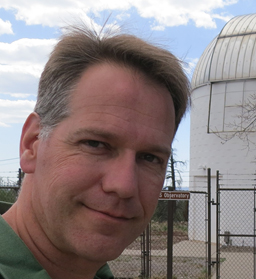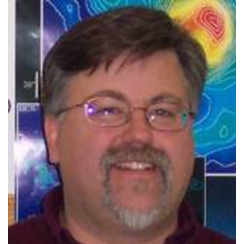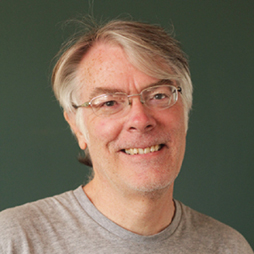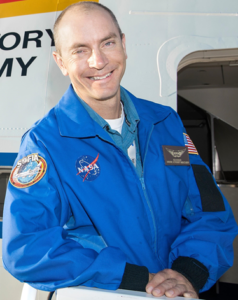 Dr. Gerard van Belle
Dr. Gerard van Belle
Astronomer, Lowell Observatory
Presenter – A Walk Around Our Stellar Neighborhood
Dr. Gerard van Belle is an astronomer at Lowell Observatory. In 2011 he came to Lowell from Munich, Germany, after working at the European Southern Observatory, Caltech, NASA’s Jet Propulsion Laboratory in Pasadena; he earned his Ph.D. at the University of Wyoming. His research interests are in the fundamental properties of stars, and in discovering and characterizing planets around those stars. He has found Flagstaff to be an idea town for brewing beer and playing with his 4 kids.
 Dr. David Koerner
Dr. David Koerner
Northern Arizona University
Presenter – Discovering New Worlds
Dr. David Koerner studied physics, mathematics, and geology at California State University Long Beach and received M.S. and Ph.D. degrees in planetary science from the California Institute of Technology. He observes planet-forming disks around other stars with space- and ground-based telescopes and has carried out research at Jet Propulsion Laboratory and University of Pennsylvania. He has been a professor of astronomy at Northern Arizona University since 2002. He originated and regularly teaches “Life in the Universe,” a liberal studies course that investigates the scientific picture of our origins and existence in the universe at large. Dr. Koerner is also a performing musician focused on works that explore the relation between music and nature/science. As pianist, he performed extensively in the Southern California area as recitalist, concerto soloist, and collaborative pianist. He has been honored with awards from the Los Angeles Concerto Competition, MTNA Collegiate piano competition (California), Krenek Competition, Joanna Hodges International Piano Competition, and participated in the VIIth International Tchaikovsky Competition in Moscow. As violist and violinist, he currently performs with Flagstaff Symphony Orchestra and Orchestra Northern Arizona. At NAU, he is completing an M.A. degree in viola/violin performance reviving the concertos of astronomer Sir William Herschel. Dr. Koerner lives north of the peaks and off the grid with his partner, biologist Dr. Gery Allan, and a sled dog team of Alaskan Malamutes.
 Dr. Lauren Edgar
Dr. Lauren Edgar
Geologist, U.S. Geological Survey Astrogeology Science Center
Presenter – Robotic and Human Exploration of the Moon and Mars
Dr. Lauren Edgar is a Research Geologist at the USGS Astrogeology Science Center in Flagstaff. Lauren earned her bachelor’s degree in Earth Sciences modified with Engineering from Dartmouth College in 2007, and her Ph.D. in Geology from the California Institute of Technology in 2013. Prior to coming to the USGS, she was a postdoctoral fellow at Arizona State University. Lauren is an active member of the Mars Science Laboratory and Mars Exploration Rover teams, and her research aims to understand Mars surface processes to identify potentially habitable environments. In her free time she enjoys hiking and running around Flagstaff, while wishing she could do that on Mars.
 Dr. Kristen Bennett
Dr. Kristen Bennett
Astrogeologist, Northern Arizona University
Presenter – Robotic and Human Exploration of the Moon and Mars
Dr. Kristen Bennett conducts research in martian and lunar science. She studied Astrophysics at UCLA and completed her Ph.D. in Geological Sciences at Arizona State University.
She is currently a postdoctoral scholar at Northern Arizona University and is a team member on NASA’s Mars Science Laboratory rover and the Lunar Reconnaissance Orbiter Diviner instrument. Her research goal is to better understand the origin and evolution of rocky bodies in our solar system. She is interested in characterizing ancient martian environments, specifically habitable environments. Her lunar research focuses on explosive volcanic eruptions that occurred on the Moon billions of years ago and what they can tell us about the lunar interior.
 Brian Skiff
Brian Skiff
Research Scientist, Lowell Observatory
Presenter – Sunset Shadows and Circles; Night Sky Orientation
Brian Skiff has spent nearly 40 years at Lowell as an observer and research assistant. This has included taking the final photographic plates with the 33cm “Pluto Camera” astrograph, and measuring thousands of plates, films, and CCD images to improve the orbits of asteroids at a time when there was little activity in this area. He also spent 1200 nights over 15 years doing single-channel photoelectric photometry on Sun-like stars to explore long-term variations analogous to the 11-year sunspot cycle. This synoptic work continues to the present via spectroscopic observation of chromospheric activity. He participated in the decade-long LONEOS survey for near-Earth asteroids, manning the telescope about 100 nights per year. More recently he has obtained rotational lightcurves via CCD for some 200 near-Earth and other asteroids using several telescopes. Having an abiding interest in bibliography and star-cataloguing, he maintains a comprehensive catalogue of stellar spectral classifications, which is one of the most-frequently used items in the VizieR catalogue-query service. Skiff is also co-author of the “Observing Handbook and Catalogue of Deep Sky Objects,” a standard reference for amateur astronomers.
 Rich Krueger
Rich Krueger
Astronomy/ Physics Teacher at Flagstaff Arts and Leadership Academy
Presenter – From Earth to Sky, A Binocular Circle
Rich is recognized for his energy and leadership in his own classroom, our community, and beyond. In 2015, Rich was selected to fly on NASA’s Stratospheric Observatory for Infrared Astronomy, and in 2017 he took students to Madras, Oregon for the Great American Eclipse. The students hosted a public star party and led authentic science experiments. Rich currently teaches science, engineering and astronomy at Flagstaff Arts and Leadership Academy and instructs engineering science for CAVIAT. He also co-founded and helps coach two award-winning robotics teams.
